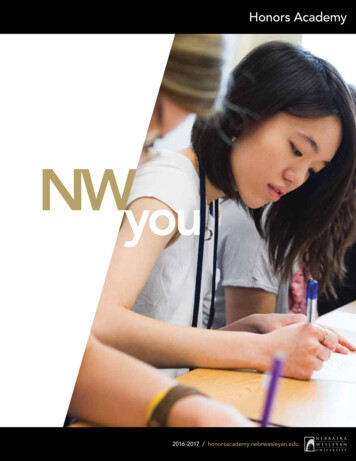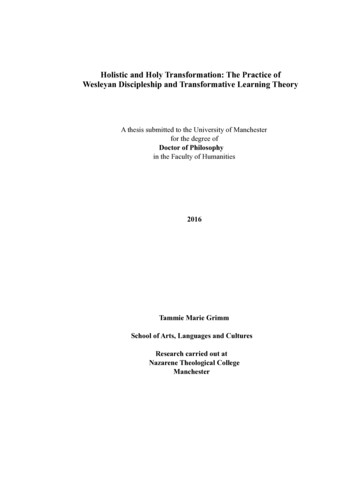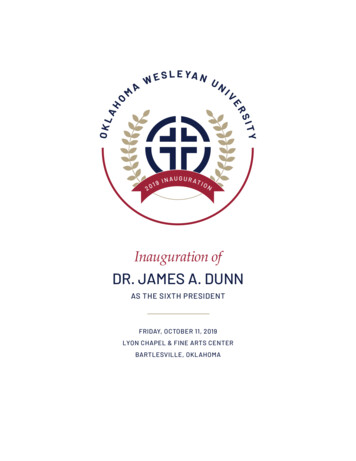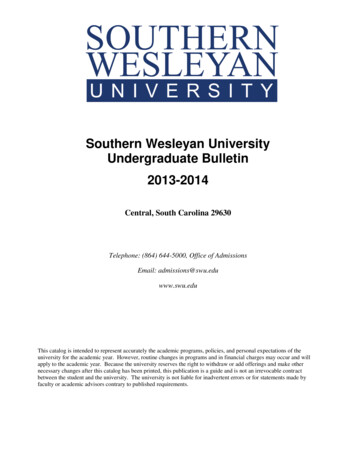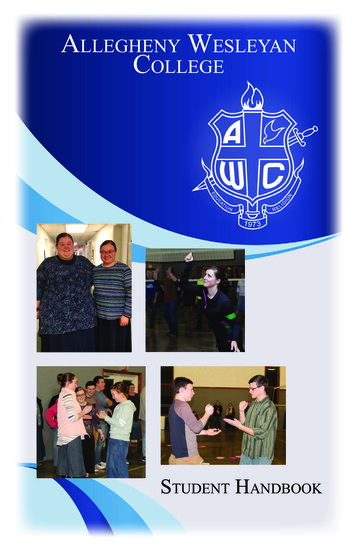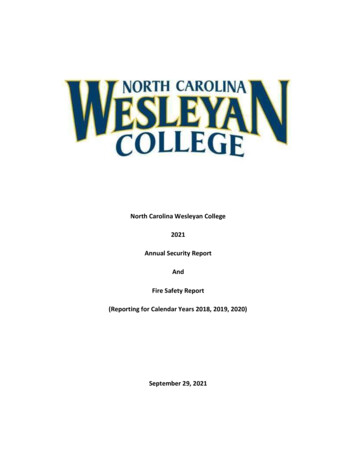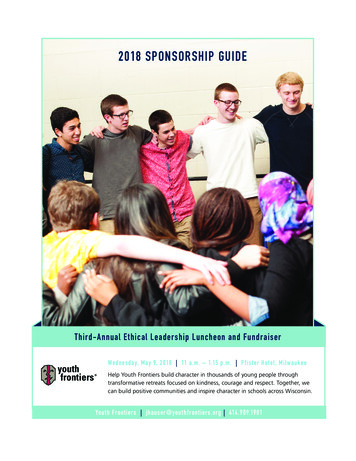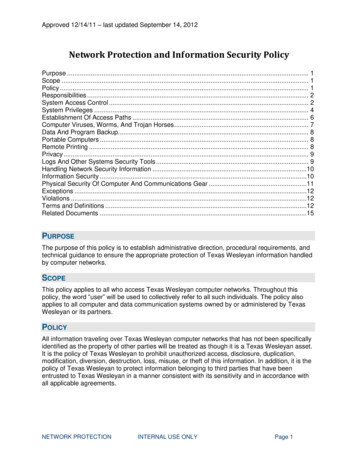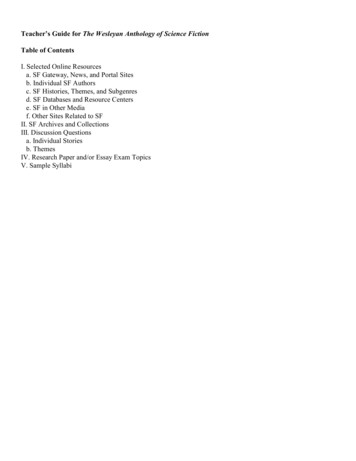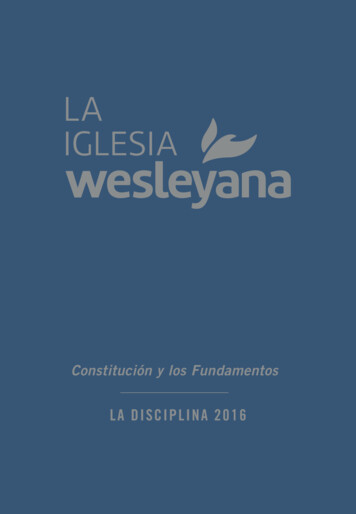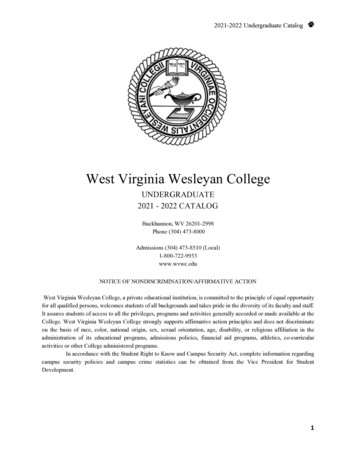
Transcription
2021-2022 Undergraduate CatalogWest Virginia Wesleyan CollegeUNDERGRADUATE2021 - 2022 CATALOGBuckhannon, WV 26201-2998Phone (304) 473-8000Admissions (304) 473-8510 (Local)1-800-722-9933www.wvwc.eduNOTICE OF NONDISCRIMINATION/AFFIRMATIVE ACTIONWest Virginia Wesleyan College, a private educational institution, is committed to the principle of equal opportunityfor all qualified persons, welcomes students of all backgrounds and takes pride in the diversity of its faculty and staff.It assures students of access to all the privileges, programs and activities generally accorded or made available at theCollege. West Virginia Wesleyan College strongly supports affirmative action principles and does not discriminateon the basis of race, color, national origin, sex, sexual orientation, age, disability, or religious affiliation in theadministration of its educational programs, admissions policies, financial aid programs, athletics, co-curricularactivities or other College administered programs.In accordance with the Student Right to Know and Campus Security Act, complete information regardingcampus security policies and campus crime statistics can be obtained from the Vice President for StudentDevelopment.1
2021-2022 Undergraduate CatalogCONTENTSCollege Calendar 2021-2022.West Virginia Wesleyan College .Academic Program .Undergraduate Programs Instructional Offerings.Business .Accounting .Business Administration .Economics .Five-Year Undergraduate/M.B.A. Program .Management .Marketing .Sport Business .Education .Teacher Education .Educational Studies.Special Education .Exercise Science and Athletic Training .Exercise Science .Health and Human Performance .Five-Year Masters in Athletic Training .Fine Arts and Humanities .Art .Arts Administration .Dance .English .English as a Second Language .Geography .History.Interdisciplinary .International Studies .Modern, Classical and World Languages .Music.Philosophy 7676872747576812
2021-2022 Undergraduate CatalogPhilosophy and Religion .Religious Studies .Theatre Arts .Nursing.BSN Nursing .Accelerated RN-to-MSN Program .Sciences .Biology .Chemistry & Biochemistry .Computer Science .Environmental Studies .Mathematics .Physical Sciences .Physics and Engineering .Social and Behavioral Science .Communication and Media Communication .Criminal Justice .Gender Studies.Health Sciences .Political Science .Psychology .Sociology.Social Justice .The Learning Center .Academic Policies .Student Life .Admissions .Expenses and Financial Aid .Register .Faculty 31133136138139141144150157160168170The West Virginia Wesleyan College Catalog is published by West Virginia Wesleyan College, Buckhannon, WestVirginia 26201-2998. The provisions of this catalog are not to be regarded as an irrevocable contract between thestudent and the College. The College reserves the right to make and designate the effective date of changes incurriculum, course offerings, fees, requirements for graduation and other regulations, at any time such changes areconsidered to be desirable or necessary.3
2021-2022 Undergraduate CatalogCOLLEGE CALENDAR2021-20222021 Fall 7Mon-TuesNew Faculty Orientation19ThursdayCommunity Day21SaturdayOrientation for new students21SaturdayResidence halls open for returning students (2 p.m.)22SundayRegistration23MondayClasses begin (8 a.m.)27FridayDeadline: Schedule change and late registration; Deadline: Pass/Fail application6MondayLabor Day Recess16ThursdayDeadline: Withdrawing from first quarter classes25Fri-SunFamily Weekend4MondayIncomplete grades from summer & spring semester due to Registrar by 3 p.m.6WednesdayProgress reports due in Registrar’s Office by 3 p.m.8FridayFounders Day (3 p.m. classes canceled, all other classes meet)8-10Fri-SunHomecoming8FridayFirst quarter classes end11MondaySecond quarter classes begin14-15Thu-FriFall Recess (classes dismissed)19TuesdayDeadline: Adding/dropping Second quarter classes25MondayDeadline: Withdrawing from full-semester classes5FridayDeadline: Withdrawing from second quarter classes19FridayThanksgiving Break begins (5 p.m.)28SundayResidence halls open (12 p.m.)29MondayClasses resume (8 a.m.)8WednesdayLast day of classes9ThursdayReading Day10-11Fri-SatFinal examinations13-14Mon-TuesFinal examinations1416TuesdayThursdayResidence halls Close by 7 p.m.Final grades due in Registrar’s Office by 3 p.m.17FridayCollege tentatively scheduled to close for holidays (4:30 p.m.)3MondayCollege reopens at 8 a.m.9SundayResidence halls open (12 p.m.)10MondayRegistration11TuesdayClasses begin (8 a.m.)2022 Spring SemesterJanuaryFebruary17MondayMartin Luther King, Jr. Day (College closed, no classes)18TuesdayDeadline: Schedule change and late registration; Deadline: Pass/Fail application3ThursdayDeadline: Withdrawing from first quarter classes16WednesdayIncomplete grades from fall semester due in Registrar’s Office by 3 p.m.4
2021-2022 Undergraduate CatalogMarchAprilMay18ThursdayProgress reports due in Registrar’s Office by 3 p.m.25FridayFirst quarter classes end28MondaySecond quarter classes begin4FridayDeadline: Adding/dropping Second quarter classes4FridaySpring Break begins (5 p.m.)13SundayResidence Halls open (12 p.m.)14MondayClasses resume (8 a.m.)17ThursdayDeadline: Withdrawing from full-semester classes30WednesdayDeadline: Withdrawing from second quarter classes14-15Thurs-FriEaster Recess (classes dismissed)23-24Sat-SunSpring Weekend23SaturdayAdmissions Open House24SundayAcademic Leadership Awards Convocation, 2 p.m.27WednesdayLast day of classes28ThursdayReading Day29-30Fri-SatFinal examinations2-3Mon-TuesFinal examinations4WednesdayResidence halls close for non-graduating students (12 p.m.)6FridayBaccalaureate7SaturdayCommencement (Residence halls close for graduating seniors by 5 p.m.)9MondayFinal grades due in Registrar’s Office for 2nd semester by 3 p.m.2022 Summer Session I (4 weeks for on-campus courses; 3 weeks for international travel courses)MayJune11WednesdayRegistration; residence halls open (2 p.m.)11WednesdayGraduate and undergraduate classes begin30MondayMemorial Day Recess7TuesdayFinal examinations2022 Summer Session II (4 weeks)June9ThursdayRegistration; classes beginJuly4MondayJuly 4th Recess7ThursdayFinal examinations5
2021-2022 Undergraduate CatalogWEST VIRGINIAWESLEYAN COLLEGEEducation is the most powerful weapon which you can use to change the world.–Nelson MandelaSTATEMENT OF MISSIONWest Virginia Wesleyan College challenges its students to a life-long commitment to develop their intellectual, ethical, spiritual,and leadership potential and to set and uphold standards of excellence. Firmly rooted in the liberal arts tradition and closely relatedto The United Methodist Church, the College is a community of learning based on fundamental principles formed at the intersectionof Christian faith and liberal education: intellectual rigor, self-discovery, human dignity, mutual support, social justice, selfdiscipline, mental and physical wellness, the appreciation of diversity and the natural world, and the judicious use of resources.The College recognizes and affirms its interdependence with the external communities - local, regional, national, and global - andits covenant with the people of West Virginia to share its educational and cultural resources.West Virginia Wesleyan College prepares its students through its curriculum of arts and sciences, pre-professional,professional, and graduate studies, and its rich campus life program. As a residential institution of higher education, the Collegeaspires to graduate broadly educated men and women who Think critically and creatively, Communicate effectively, Act responsibly, and Demonstrate their local and world citizenship through service.A BRIEF HISTORYThe mission of West Virginia Wesleyan College is reflected in good measure in its name. Its founding in 1890 by the West VirginiaAnnual Conference of the Methodist Episcopal Church climaxed a 16-year effort to establish a center of learning in the then-youngstate that would reflect the values of the Methodist community, meet the church’s need for an educated leadership, and provide aneducational resource for the general citizenry of the state and region.Although the founders were always loyal to these over-arching principles, the immediate catalyst for the College’sestablishment was perhaps less lofty: by 1882, Methodists believed they had “lost control” of West Virginia University inMorgantown, leading to an exodus from the state university of Methodist students who now sought an educational alternative.Originally known as the West Virginia Conference Seminary, the new school opened September 3, 1890, in a splendid newthree-story brick building located on the present site of the Lynch-Raine Administration Building. (The original building wasdestroyed by fire in 1905 and replaced the following year by the current structure.) In keeping with the tradition of seminaries oracademies of the day, it offered largely pre-college instruction. Bennett W. Hutchinson, a graduate of Ohio Wesleyan Universityand Boston University School of Theology and an ordained minister, came from Rhode Island to accept the presidency. Mr. RoyReger of Buckhannon was the first of 201 students to enroll that first year.Full-fledged college work was initiated in 1900 and gradually expanded until the first baccalaureate degrees were awarded in1905. After one year as Wesleyan University of West Virginia, the name was officially changed in 1906 to West Virginia WesleyanCollege, in honor of Methodism’s founder, John Wesley. Pre-college work continued through 1922-23, when it was deemed nolonger necessary due to the growth of high schools in the state.The early beginnings of the College were modest, and the fledgling school was frequently plagued by debt, debt that becameparticularly threatening during the Great Depression of the 1930s. But the shortage of fiscal resources never dampened the visionof the College community and its supporters. By 1939, when the three major Methodist bodies united to become the MethodistChurch, leaders of the College dreamed of making Wesleyan the outstanding liberal arts college in the state – a challenging visionfor a financially struggling college of fewer than 500 students.Historians of the College credit Thomas W. Haught, an 1894 graduate of the Seminary, 20-year academic dean (1909-1929),long-time faculty member, and three-time acting president, as one of Wesleyan’s most influential champions of academic6
2021-2022 Undergraduate Catalogexcellence. In addition to strengthening the faculty and the emphasis on academics, he led efforts to achieve initial accreditationby the North Central Association of Colleges and Secondary Schools in 1927.For many, the presidency of Dr. Stanley H. Martin (1957-1972) marks the period of the College’s most dramatic growth,measured in student enrollments, increasing academic stature, and an expanding physical plant. It was largely his vision that gavethe campus its present Georgian character. Annie Merner Pfeiffer Library, Benedum Campus Center, Benedum Hall (originallynamed New Hall), Christopher Hall of Science, Doney Hall, Jenkins Hall, Holloway Hall, Martin Religious Center, MiddletonHall, McCuskey Hall, and Wesley Chapel are tangible expressions of the expansion that characterized President Martin’s tenure.Following the successful tenure of Dr. Martin, John D. Rockefeller IV served as Wesleyan’s President from 1973 to 1975.The current gymnasium and athletic center were completed during his tenure. For a period of time, it was referred to on campusas “The New Gym,” but was renamed the John D. Rockefeller IV Physical Education Center after his departure in 1975.Immediately following his tenure at Wesleyan, Rockefeller served as Governor of West Virginia from 1977 to 1985 and went onto serve as the Junior Senator from West Virginia in the United States Senate.During the 1980’s, Wesleyan offered its first graduate degree program in business administration and added the CamdenResidence Hall Complex. The French A. See Dining Center was constructed in the mid 1990’s to provide a centralized locationfor students to dine and socialize each day. Extensive financial resources were also invested in information technology, with anemphasis on academic instruction during this decade. The College became one of the first institutions in the nation to requirestudents to have laptop computers.Many features of modern campus life at Wesleyan have long traditions. An example is football, which was introduced in thepre-college seminary in 1898. The school colors of orange and black go back to that very first game, when fullback and teamcaptain Frank Thompson wore a turtleneck sweater in Princeton University’s orange and black to honor two football greats of thatuniversity. A more comprehensive athletic program was formally organized at the collegiate level in 1902. Early sports includedfootball, baseball, basketball, and gymnastics – for men only. In 1996, Wesleyan received the Sears and Roebuck Award for themost successful athletic program in the nation. From 1992 to 2005, Wesleyan captured the West Virginia Intercollegiate AthleticConference’s Commissioner’s Cup as the most successful athletic program. Since 2006, the College has added women’s golf,women’s lacrosse, and indoor track to make a total of twenty-one sports. In 2013-2014 Wesleyan joined a new athletic conference,the Mountain East Conference and captured five conference championships. Approximately one-third of our students participatein varsity athletics. A new multi-purpose athletic complex, including an eight-lane track and new turf field, was also recentlyconstructed.Music was an important part of campus life, beginning in 1890 when two pianos and an organ were installed in the seminary’snew building. In 1902, the current Annex Building was constructed as the Conservatory of Music, the College’s first buildingdedicated solely to academic purposes. The school’s “unofficial” anthem “My Home Among the Hills,” written by former trusteeE.W. “Bill” James, is sung at every school ceremony. The song has been used at special functions throughout the state, includingthe governor’s inaugural ceremonies.The Greek system was initiated on campus in 1925, when the Board of Trustees authorized the establishment of two sororitiesand three fraternities. And as early as 1910, the Wesleyan Volunteer Band–followed in 1930 by the Student Volunteer Movement–established a tradition of service among Wesleyan students, concentrating in those early years on foreign missions of the Christianchurch, but also maintaining strong ties to the local community. Community service programs have been expanded to become anintegral part of the College’s student life program.Much has changed in higher education and in West Virginia since West Virginia Wesleyan College was established. Yet thefounders would recognize much of today’s curriculum and many of today’s campus traditions as worthy continuations of their earlyefforts.LEARNING ENVIRONMENTWest Virginia Wesleyan College offers the technological and physical facilities to create an environment suited for teaching andlearning. The elegant steeple and classic Georgian design of Wesley Chapel set the architectural style of the campus, while apartnership with Dell to provide a student purchase ubiquitous computing program forms the keystone of a comprehensivetechnology infrastructure.The oldest of Wesleyan’s 33 buildings is Agnes Howard Hall, built in 1895 and listed on the National Register of HistoricPlaces. It is one of ten residence halls on campus. In recent years the College has completed construction on a number of newfacilities: Virginia Thomas Law Center for the Performing Arts in 2009, the David E. Reemsnyder Research Center in 2010, thenewest residence hall, Dunn Hall, in 2011, and the O’Roark Nordstrom Welcome Center in 2014. Together with the Chapel and7
2021-2022 Undergraduate CatalogReligious Center, the Physical Education Center, the Wellness Center, and other special facilities described elsewhere in thispublication, these buildings set in the park-like atmosphere of the campus offer students an attractive place to live and work.Key academic buildings of the College include the Christopher Hall of Science and the David E. Reemsnyder Research Center,the home of Wesleyan’s outstanding programs in biology, chemistry, computer science, engineering physics, environmentalscience, mathematics, physics, and psychology. Modern, well-equipped laboratories complement the building’s planetarium,herbarium, and greenhouse and provide the ideal setting for faculty-student research. McCuskey Hall, the home of the ArtDepartment, has studios for drawing and printmaking, as well as a computer lab for graphic design. McCuskey also houses SleethGallery, which sponsors regular visiting artist’s workshops, and curated exhibitions.The Loar Memorial Building provides classrooms, practice rooms, and private studios for vocal and instrumental faculty inthe Department of Music. Its recital hall seats audiences of 165 for performances and serves as rehearsal space for the department’smany ensembles. Its memorial lounge provides an attractive setting for formal gatherings. In keeping with Wesleyan’s commitmentto educational technology, Loar Memorial Building has a computer music lab integrating personal computers with instrumentalkeyboards for music composition, sequencing, analysis, and performance in an interactive group setting.The Virginia Thomas Law Center for the Performing Arts provides performance and technical lab spaces for the Departmentof Theatre Arts. The facility includes a 374-seat auditorium and a function room, the Greek Alumni Room. In addition to servingas the home for WVWC Theatre and Dance productions and the Wesleyan Jazz Ensemble concerts, the facility hosts many otherconcerts and programs as part of the Arts Alive series and Wesleyan speaker programs.INFORMATION TECHNOLOGYWest Virginia Wesleyan College requires that each entering student have a laptop computer suitable for performingcoursework, and many courses integrate technology use into the course curriculum. Minimum and recommended computerspecifications, in addition to purchasing information and other IT related information, is posted and updated regularly on theCollege’s Computing Services Helpdesk web site(http://helpdesk.wvwc.edu). The laptop requirement is facilitated by a student purchase program offered through a partnershipwith Dell Corporation. Through this partnership, students have access to “Wesleyan Configured” models and discount pricing. TheCollege’s Computing Services Helpdesk is also an authorized Dell repair facility, providing on-campus warranty service for Dellsystems, regardless of where they are purchased.At Wesleyan, high-speed fiber optic network, which utilizes a Gigabit Ethernet backbone and switched Ethernet technology tolink all buildings on campus, provides connectivity to the Internet. The campus also has a state-of-the-art, campus-wide wirelessnetwork, which provides wireless connectivity in all campus buildings. With more than 80 miles of network wiring and localwireless network functionality, students and faculty have access to the Internet and campus electronic resources from any residencehall room, classroom, laboratory, faculty office, meeting room, or other social space. The Computer Center, in Christopher Hall,houses additional computing facilities to support instructional and administrative computing and high-speed printing. Allclassrooms support either fixed or portable computer projection; many have been updated with large screen displays, built-in audio,and document projectors; and some classrooms have electric power at every seat for notebook users.The Annie Merner Pfeiffer Library is committed to providing high quality resources and services that empower students foradvanced learning. Electronic materials are increasingly important in the collection as the needs and expectations of students havechanged. In fact, for the first time, electronic books and periodicals outnumber those in print. Interlibrary Loan is available formaterials that are beyond our collections. The expert staff provides educational programming for students and faculty in the useof both traditional and electronic resources. In addition to its collections and research services, the Library offers media viewingfacilities, areas for group study, and a quiet place for reading and reflection. The Upshur Reading Room serves as a modern-daytown square where people can come to find information and to discuss it in the forms of panel discussions, lectures, and poetryreadings while enjoying inspirational student artwork.As part of West Virginia Wesleyan’s membership in the Appalachian College Association (ACA) and the Bowen CentralLibrary of Appalachia (BCLA), our library is pleased to be able to offer access to an impressive variety of resources to our faculty,staff, and students. The BCLA has a core collection of more than 200,000 eBook titles with more being added each year. Inaddition, the BCLA also subscribes to databases including journals, reference materials, digital images, and language learning tools,at an annual consortium cost of more than 400,000, and provides opportunities for member institutions to enjoy group pricingdiscounts for others. Participation in this organization allows us to offer resources at a level enjoyed by much larger institutionswhile remaining small enough to give personalized service and attention.8
2021-2022 Undergraduate CatalogTogether, the technological and physical facilities at West Virginia Wesleyan College provide an outstanding setting forcollege life. They are a significant resource for a college program that prides itself on its excellent educational offerings, itsoutstanding faculty, and its wide variety of cultural, social, and athletic events.WESLEYAN ACCREDITATIONWest Virginia Wesleyan is accredited by The Higher Learning Commission (30 North LaSalle Street, Suite 2400, Chicago,IL 60602-2504; telephone 1-800-621-7440) and approved by the University Senate of The United Methodist Church. It is a memberof the National Association of Schools of Music and is approved by the West Virginia Department of Education. The teacherpreparation program is approved by the West Virginia Department of Education and by the Council for the Accreditation ofEducator Preparation (CAEP), 1140 Nineteenth St, NW, Number 400, Washington, DC 20036; telephone 202-223-0077. TheCollege participates in the Interstate Certification Project, whereby a number of states certify teachers graduating from Wesleyan’sDepartment of Education. The baccalaureate degree program in nursing/master’s degree program in nursing/ and post-graduateAPRN certificate program at West Virginia Wesleyan College are accredited by the Commission on Collegiate Nursing Education(http://www.ccneaccreditation.org). Wesleyan’s BSN program is fully approved by the West Virginia Board of Examiners forRegistered Nurses, 90 MacCorkle Ave SW #203, South Charleston, WV 25303, telephone 304-744-0900. The Doctor of NursingPractice program at West Virginia Wesleyan College is pursuing initial accreditation by the Commission on Collegiate NursingEducation (http://www.ccneaccreditation.org). Applying for accreditation does not guarantee that accreditation will be granted.Shenandoah University is accredited by the Commission on Colleges of the Southern Association of Colleges and Schools, 1866Southern Lane, Decatur, GA 30033-409, (404) 679-4500. Shenandoah’s Nurse-Midwifery Program is accredited by the AmericanCollege of Nurse-Midwives Accreditation Commission for Midwifery Education (www.midwife.org/accreditation). Shenandoah’sPsychiatric Mental Health Nurse Practitioner Program is accredited by the Commission of Collegiate Nursing Education. Theathletic training program is accredited by the Commission on Accreditation of Athletic Training Education (CAATE), (6836 AustinCenter Blvd., Suite 250, Austin, TX 78731-3193; telephone 512-733-9700).The College holds membership in the Appalachian College Association, the National Association of Independent Collegesand Universities, the American Association of Colleges for Teacher Education, the National Association of Schools and Collegesof The United Methodist Church, the Council of Independent Colleges, and the Council of Graduate Schools.9
2021-2022 Undergraduate CatalogACADEMIC PROGRAMACADEMIC ADVISINGDuring the initial part of the first semester of the freshman year, students are advised by their First-Year Experience instructor.Prior to the start of preregistration for the next semester, each student is assigned a faculty advisor in his or her field of study or ina related field. Education is ultimately the responsibility of the learner, but students undecided about a major are assigned advisorswho will help them explore their personal interests and set appropriate educational goals. The advisor’s input to the student’sschedule enhances student awareness of how each semester’s schedule contributes to overall progress towards graduation. TheAcademic Services staff are available to assist students and to support the role of the major advisor. Through these advising efforts,West Virginia Wesleyan College seeks to offer its students guidance that serves them well during and after their college careers.While the College works to guide each student to the proper courses, the student bears the ultimate responsibility for completingall graduation requirements.PLAN OF STUDYThe academic program at West Virginia Wesleyan College consists of three components: the major, general education courses, andfurther electives for the exploration of a wider scope of topics. The total academic experience derives from and is designed tofulfill the Statement of Mission (page 6).GENERAL EDUCATION PROGRAM AND FIRST YEAR EXPERIENCEThe core curriculum provides a progressive, growth-oriented scaffold that will support the development of personal, ethical, andcollaborative habits of mind. By engaging issues across disciplines and through multiple lenses, students will develop skills andperspectives that will help them to more nimbly and confidently navigate an ever-changing cultural landscape. Their growthportfolio will provide an opportunity to sharpen the reflective skills necessary for an examined life, while the collaborative,multimedia senior presentation will showcase the full range of skills students will carry forward into the world.Program Goals:1. Students will critically integrate multiple bodies of knowledge for the purposes of doing good work and living goodlives.2. Through a cumulative, collaborative, and integrative approach, students will develop an interdisciplinary mindset andcritical thinking skills across multip
West Virginia Wesleyan College, a private educational institution, is committed to the principle of equal opportunity for all qualified persons, welcomes students of all backgrounds and takes pride in the diversity of its faculty and staff. . discipline, mental and physical wellness, the
